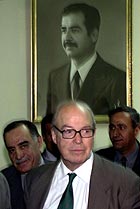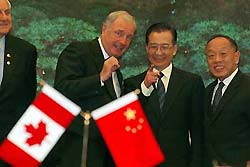Ralph Klein's Speech last Tuesday (Jan 11) before the Canadian Club at the Palliser Hotel in Calgary had been, given the heralded topic of healthcare, much anticipated. Back in June of last year, the premier had promised that his "new" plan to reform provincial healthcare in Alberta was going to shake things up; it would challenge the status quo and the Canada health Act, he said. Some were excited and some were already quaking in their Birkenstocks; most were curious. Then, during the provincial election campaign in the fall of 2004, he pulled a Kim Campbell (you know, same political party) by saying that his healthcare plan was far too complex to be addressed during an election campaign. It would be announced (and discussed) only when it was good and ready, after Albertans re-elected him. Brian Mason had the right instinct, it seems, when his party published a healthcare for dummies pamphlet, hoping that the premier might read it and figure out some of the basics. We are not sure whether he did or not. Lucky for the premier, his reluctance to talk about policy during the election may be all that he emulated from Kim. So, when it was finally announced this week that the much-awaited, earth-shaking healthcare reform plan would be unveiled, much was expected. It proved to be a serious disappointment.
First, there is nothing earth-shaking in his new proposal. Simply put, Klein's health reforms are a repackaging of the existing status quo. It is an illusion. And not even the strategy is new. It seems to be more focused on rehabilitating the premier's battered political image than in offering substance about healthcare. In the Calgary speech (and the same is true for the subsequent speeches in
Ontario and
Quebec), Klein tries to paint himself as the man that will break the ideological, sterile, deadlocked healthcare debate in this country.
From Klein's eyes, there are two clashing positions that compete for attention. One he sees as the status quo position where the state controls and funds all delivery and decisions of delivery made in the system. The other is the position that wants the whole of the healthcare delivery be turned into private, for profit, hands. In reality, neither of these positions exists in Canada in any degree of political significance anymore. The present status quo, in addition, already offers non-government controlled areas; for-profit pockets, as it were. In some cases, it is a mixture of private and public services like some laser eye surgery, MRI clinics and radiology labs. And although there are private for-profit segments such as most dental services and most cosmetic surgery, not many serious souls really expect that the entire system be given entirely to the private sector. In short, Ralph is creating straw men so that he can then launch against them to defeat them, so that he can position himself as a moderate.
Once the rigid imagined dichotomy is presented, Klein is able to paint himself as the man whose ideas and actions are going to transcend the tidy ideological division for the sake of Albertans, and should others heed his call, many Canadians as well. Ralph is the future and savior of healthcare, if you must know. He has become not just the conciliatory pragmatist who shuns ideological constructs, but the man of new ideas, and the new man of action at the same time. He calls the new packaging, his "third way." In his newly-conceived world, public finding and control will remain while a not-yet determined type (and number) of procedures will be delivered by private, even for profit, operations that will be compensated by the public purse using roughly the same pay scale as the public system. In other words, Ralph will create a hybrid system, a whole new system, that will be different from the one we now have, and different from the demonized American system, a "third way."
There is precious little
new in the third way, however. The emperor has no clothes. As a matter of fact, it is worth repeating it, the "third way" is the status quo in newspeak. There are, to be sure, elements of new in the promise of a new symposium of medical experts to take place in the spring of this year. More money will be spent on medical research. Greater emphasis will be placed on children. A new electronic record system, which was recommended by Mazankowski three years ago, will finally be adopted. But neither of these will change the decaying character of the present system, and will likely not address the most fundamental structural problems of Alberta's (or Canada's) healthcare.
There can be no guarantee that a symposium and more research money will translate in meaningful results on the ground for waiting patients. Farming out services to private operations may indeed relieve some of the pressures on the existing public system, but there is nothing new or innovative about that approach. Ralph did not invent it. It is already being done, and it has been done in Alberta and elsewhere in the country for years now. Contracting out will not change the status quo, nor will it solve many of the more fundamental problems that the public structure brings by nature. Simply contracting out abortions to the Kensington abortuary in Calgary has not erased the problems of the system. The "third way" is a smoke screen. Most of us know it. Ralph knows it too!
The Calgary speech is clearly a public relations campaign. Klein carelessly relinquished space in the public sphere and abandoned the discourse on healthcare to his opposition during the last election. Now, he has gone on the offensive, trying to claim it back, repositioning himself, and trying to make all the others look like ideologues while he peddles an image of the pragmatist and wise statesman for himself. And it may just work, as far as image is concerned. But the strategy goes beyond reclaiming the discourse by way of newspeak. It is also designed to improve (or restore in some cases) the premier's image in the few months before his retirement. Like all good populists, Klein likes to be liked.
Ralph has been one of the most successful politicians in Canada in recent memory, even if in the last year or so his popularity has declined. He needs a gimmick to improve his battered image, a whole new gimmick. The fiscal issues about which he was rather successful are no longer new, and he has become less popular in spite of his record there. His rhetorical repositioning on healthcare may be just the ticket. In addition to his image as a slayer of debts, eraser of deficits and reducer of taxes, Klein may be looking for more to add to his "legacy." And healthcare reformer may be just it. But he would be sorely mistaken, if he thinks that he can get there by simply blowing hot air. Most of us in southern Alberta are well used to those warm Pacific winds coming above the Rockies, Chinooks!
As Kim Campbell was fond of saying, "charisma without substance is a very dangerous thing." Words and appearances alone do not beget new legacies. It will take a lot more than shiny new political labels for old existing realities.





 The first rent-a-plane Antonov (picture above) has arrived in Canada and has now left for Colombo. A second (and smaller) plane will arrive tonight, and is expected to make the trip tomorrow morning, it has been reported. The bold and ever-decisive Minister of defense, the Hon. Bill Graham, will be at hand at 8 Wing Trenton tomorrow morning to see the second plane take off. It is estimated that each of the four return trips undertaken by the Antonovs carrying DART equipment and personnel will cost about $1.6-million US.
The first rent-a-plane Antonov (picture above) has arrived in Canada and has now left for Colombo. A second (and smaller) plane will arrive tonight, and is expected to make the trip tomorrow morning, it has been reported. The bold and ever-decisive Minister of defense, the Hon. Bill Graham, will be at hand at 8 Wing Trenton tomorrow morning to see the second plane take off. It is estimated that each of the four return trips undertaken by the Antonovs carrying DART equipment and personnel will cost about $1.6-million US.









